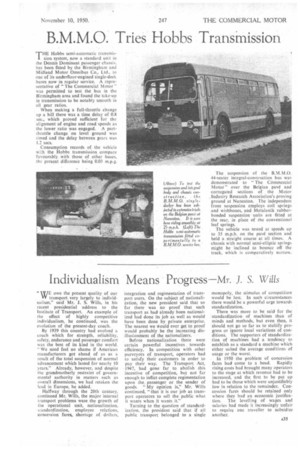Individualism Means Progress—Mr. J. S. Wills
Page 53

If you've noticed an error in this article please click here to report it so we can fix it.
" WE owe the present quality of our
VY transport. very largely to individualism," said Mr. J. S. Wills, in his recent presidential address to the Institute of Transport. An example of the effect of highly competitive individualism, he continued, was the evolution of the present-day coach.
By 1939 this country had evolved a coach which for strength, reliability, safety, endurance and passenger comfort was the best of its kind in the world. "We need feel no shame if American manufacturers got ahead of us as a result of the total suspension of normal advancement which lasted for nearly 10 years." Already, however, and despite the grandmotherly restraint of governmental authority in matters such as overall dimensions, we had retaken the lead in Europe, he added.
Halfway through the 20th century, continued Mr. Wills, the major internal transport problems were the growth of the operational unit, nationalization. standardization, employee relations, concession fares, shortage of dollars, integration and regimentation of transport users. On the subject of nationalization, the new president said that so far there was no proof that such transport as had already been nationalized had done its job as well as would have been done by private enterprise. The nearest we Would ever get to proof would probably be the increasing disillusionment of the nationalizers.
Before nationalization there were certain powerful incentives towards efficiency. In competition with other purveyors of transport, operators had to satisfy their customers in order to pay their way. The Transport Act, -1947, had gone far to abolish this incentive of competition, but not far enough to inflict complete regimentation upon the, passenger or the sender of goods. "My opinion is," Mr. Wills continued, "that it is our job as transport operators to sell the public what it wants when it wants it."
Turning to the question of standardization, the president said that if all public transport belonged to a single monopoly, the stimulus of competition would be lost. In such circumstances there would be a powerful urge towards standardization.
There was more to be said for the standardization of machines than of minds and methods, but even then, it should not go so far as to stultify progress or ignore local variations of conditions. The supporters of standardization of machines had a tendency to establish as a standard a machine which either suited the average conditions of usage or the worst.
In 1950 the problem of concession fares had come to a head. Rapidly rising costs had brought many operators to the stage at which revenue had to be increased, and the first to be put up had to be those which were unjustifiably low in relation to the remainder. Concession fares should be retained only where they had an economic justification. The levelling of wages and salaries had made it increasingly unfair to require one traveller to subsidize another.




















































































